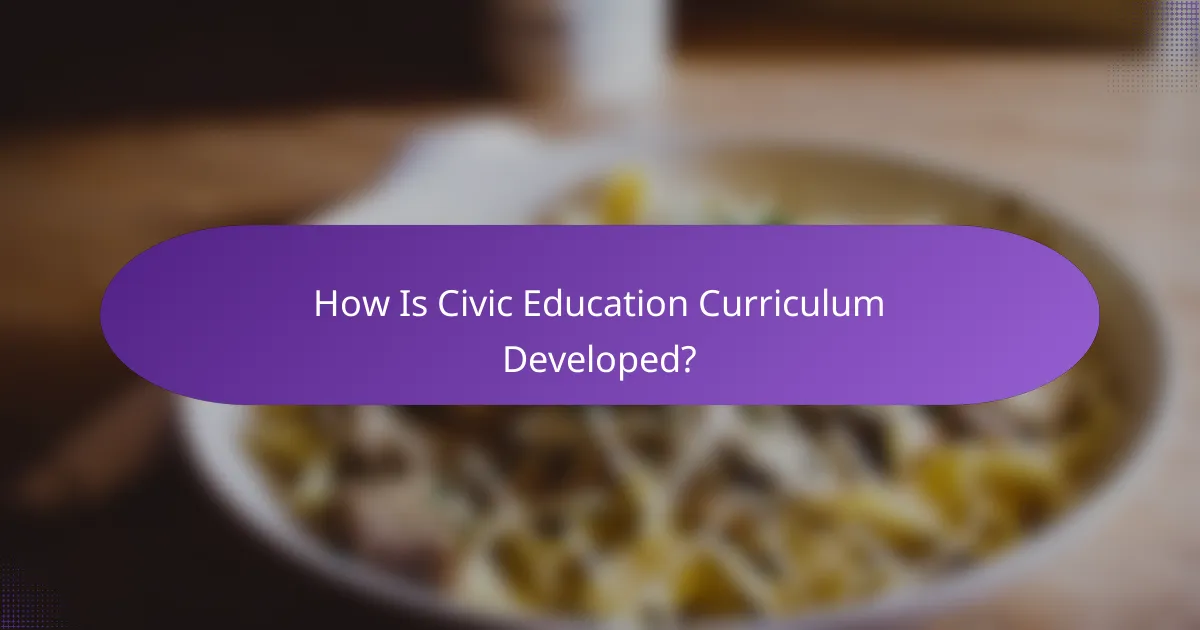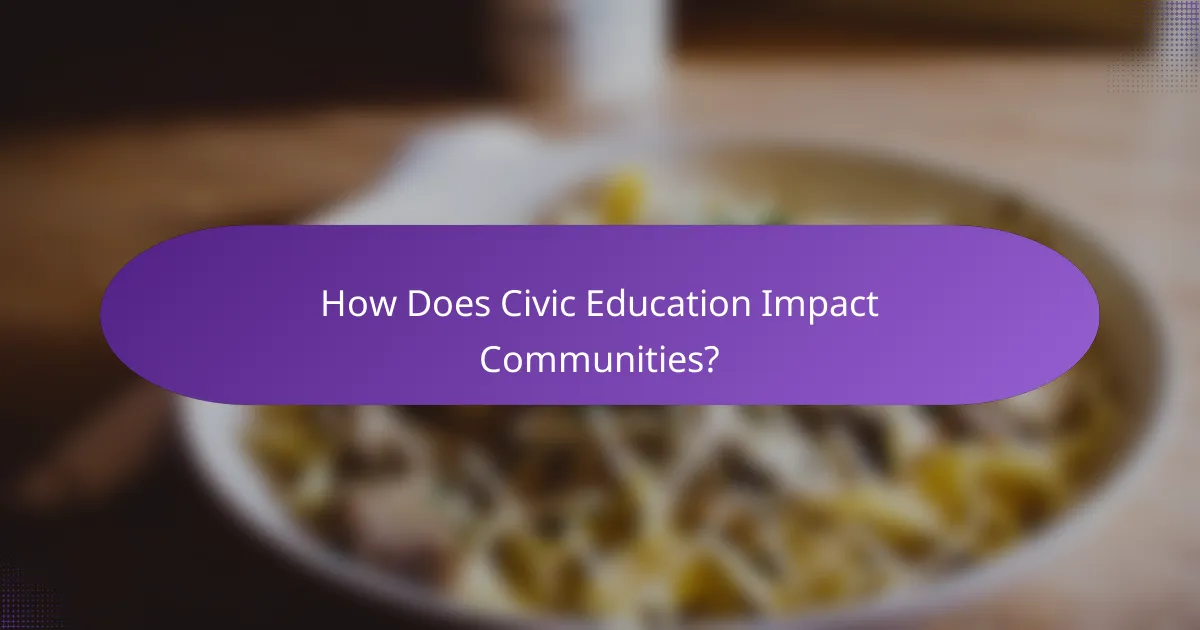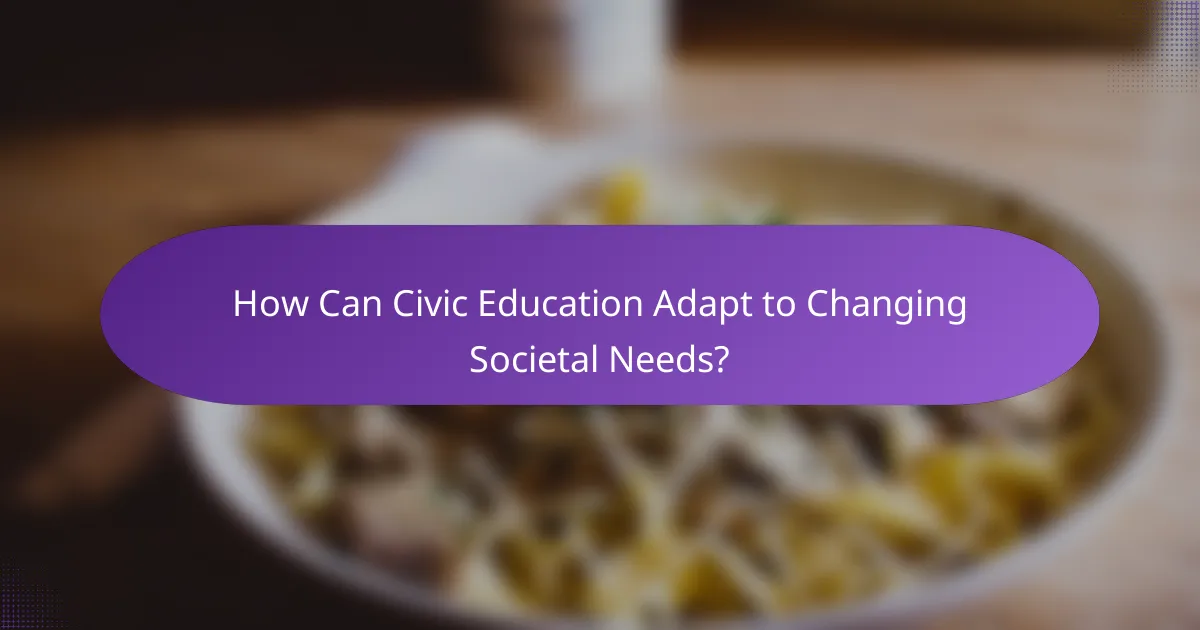Civic education is essential for equipping individuals with the knowledge and skills needed to actively participate in their communities and governments. By fostering a sense of responsibility and empowering citizens, it contributes to a more informed and engaged populace. The development of civic education curricula involves collaboration among stakeholders to ensure relevance and effectiveness in promoting civic knowledge and engagement among students.

What Are the Benefits of Civic Education?
Civic education provides individuals with the knowledge and skills necessary to participate effectively in their communities and governments. It fosters a sense of responsibility and empowers citizens to engage in civic life, leading to a more informed and active populace.
Enhanced Civic Engagement
Enhanced civic engagement refers to the increased participation of individuals in community activities and political processes. Civic education encourages people to vote, attend town hall meetings, and engage in discussions about local and national issues, thereby strengthening democracy.
For example, students who receive civic education are more likely to volunteer for community service or participate in advocacy campaigns. This engagement not only benefits individuals but also contributes to a more vibrant and responsive civic culture.
Improved Critical Thinking Skills
Civic education promotes improved critical thinking skills by encouraging individuals to analyze information, question assumptions, and evaluate different perspectives. This analytical approach is essential for understanding complex social and political issues.
Students learn to assess the credibility of sources, weigh evidence, and construct well-reasoned arguments. These skills are invaluable not only in civic contexts but also in personal and professional decision-making.
Promotion of Social Cohesion
Promotion of social cohesion is a key benefit of civic education, as it fosters understanding and respect among diverse groups within a community. By learning about different cultures, histories, and viewpoints, individuals develop empathy and a sense of belonging.
Programs that include collaborative projects or discussions on social issues can help bridge divides and create a more inclusive society. This cohesion is vital for maintaining peace and stability in increasingly diverse communities.
Informed Decision-Making
Civic education equips individuals with the tools to make informed decisions regarding public policies and community issues. Understanding the implications of laws, regulations, and social programs enables citizens to advocate effectively for their needs and interests.
For instance, knowledge of local government processes can help residents engage in budget discussions or influence policy changes that affect their neighborhoods. This informed participation leads to better outcomes for communities.
Preparation for Active Citizenship
Preparation for active citizenship involves equipping individuals with the skills and knowledge necessary to engage fully in civic life. Civic education teaches the rights and responsibilities of citizenship, encouraging individuals to take initiative in their communities.
Activities such as mock elections, debates, and community projects can provide practical experience. This hands-on approach prepares students to navigate real-world civic challenges and fosters a lifelong commitment to civic involvement.

How Is Civic Education Curriculum Developed?
Civic education curriculum is developed through a collaborative process that involves various stakeholders, aligning with educational standards, and integrating diverse perspectives. This ensures that the curriculum is relevant, comprehensive, and effective in fostering civic knowledge and engagement among students.
Stakeholder Involvement
Developing a civic education curriculum requires input from a range of stakeholders, including educators, policymakers, community leaders, and students. Engaging these groups helps to identify local needs and priorities, ensuring the curriculum reflects the community’s values and goals.
Regular consultations and feedback sessions can enhance the curriculum’s relevance. For instance, involving local civic organizations can provide insights into current civic issues that should be addressed in the curriculum.
Alignment with Educational Standards
The curriculum must align with national and state educational standards to ensure it meets required learning outcomes. This alignment helps educators understand what students should know and be able to do by the end of the course.
For example, in the United States, the C3 Framework for Social Studies State Standards provides guidelines that can be used to structure civic education content. Adhering to these standards can also facilitate smoother integration into existing educational systems.
Integration of Diverse Perspectives
Incorporating diverse perspectives is crucial for a well-rounded civic education curriculum. This includes representing various cultural, social, and political viewpoints to foster critical thinking and empathy among students.
Curricula can include case studies, historical events, and contemporary issues from multiple angles. For instance, discussing civil rights movements from various cultural perspectives can enrich students’ understanding of civic engagement.
Use of Evidence-Based Practices
Effective civic education curricula utilize evidence-based practices that have been shown to enhance student learning and engagement. This may involve active learning strategies, such as simulations, debates, and project-based learning.
Educators should regularly assess the effectiveness of these practices through student feedback and performance metrics. Implementing iterative improvements based on this data can lead to a more impactful civic education experience.

What Are Effective Civic Education Programs in the USA?
Effective civic education programs in the USA aim to equip students with the knowledge and skills necessary for active participation in democracy. These programs often emphasize critical thinking, civic engagement, and understanding governmental processes, fostering informed and responsible citizens.
iCivics
iCivics is an innovative platform designed to teach students about civics through interactive games and resources. Founded by former Supreme Court Justice Sandra Day O’Connor, it provides engaging materials that cover topics like the Constitution, branches of government, and civic responsibilities.
Teachers can integrate iCivics into their curriculum easily, as it offers lesson plans and assessments aligned with educational standards. The platform is widely used across the country, making it a popular choice for educators seeking to enhance civic literacy.
Civics Unplugged
Civics Unplugged focuses on empowering young people to become civic leaders through project-based learning and community engagement. This program encourages students to identify local issues and develop actionable solutions, fostering a sense of agency and responsibility.
Participants can join workshops, collaborate on projects, and access resources that promote civic skills. By emphasizing real-world applications, Civics Unplugged helps students understand the impact of their actions within their communities.
Generation Citizen
Generation Citizen aims to ensure that every student receives a meaningful civic education, emphasizing the importance of active participation in democracy. The program partners with schools to provide experiential learning opportunities that connect classroom lessons to real-life civic engagement.
Through its curriculum, students engage in projects that address community issues, allowing them to practice advocacy and leadership skills. Generation Citizen also offers training for teachers, ensuring that they are well-equipped to guide students in their civic journeys.

How Does Civic Education Impact Communities?
Civic education significantly impacts communities by fostering informed and engaged citizens. It equips individuals with the knowledge and skills necessary to participate actively in civic life, leading to stronger, more cohesive communities.
Strengthened Community Bonds
Civic education promotes understanding and collaboration among community members. By learning about local issues and governance, individuals are more likely to engage in discussions and initiatives that benefit their neighborhoods.
Programs that encourage volunteerism and civic participation can create networks of support, enhancing social ties. For example, community clean-up events or local forums can bring residents together, fostering a sense of belonging and shared responsibility.
Increased Voter Participation
Effective civic education directly correlates with higher voter turnout. When citizens understand their rights and the electoral process, they are more inclined to participate in elections.
Educational initiatives that target young voters, such as workshops in high schools, can lead to increased engagement. Studies suggest that communities with robust civic education programs see voter participation rates that are significantly higher than those without such initiatives.
Enhanced Local Governance
Civic education empowers citizens to hold local officials accountable and engage in governance. Informed citizens are more likely to advocate for policies that reflect community needs and priorities.
Active participation can lead to improved decision-making processes within local governments. For instance, community meetings that encourage public input can result in policies that are more aligned with the desires of residents, ultimately leading to better governance outcomes.

What Are the Future Trends in Civic Education?
Future trends in civic education are increasingly focused on integrating technology, promoting global citizenship, and addressing social justice issues. These trends aim to create a more engaged and informed citizenry that can navigate complex societal challenges.
Digital Learning Platforms
Digital learning platforms are transforming civic education by providing interactive and accessible resources. These platforms often include online courses, webinars, and virtual simulations that allow students to engage with civic concepts in real-time.
For effective implementation, educators should consider platforms that offer user-friendly interfaces and diverse content. Examples include platforms like Coursera or edX, which can provide courses on civic engagement and democratic processes.
Focus on Global Citizenship
The focus on global citizenship in civic education encourages students to understand their role in a interconnected world. This approach emphasizes the importance of cultural awareness, international cooperation, and the impact of global issues on local communities.
To foster global citizenship, educators can incorporate case studies from various countries and encourage discussions about global challenges such as climate change and human rights. Engaging students in projects that connect local actions to global outcomes can also enhance this understanding.
Emphasis on Social Justice Issues
Emphasizing social justice issues in civic education helps students recognize and address inequalities within their communities. This trend encourages critical thinking about systemic issues such as racism, poverty, and access to education.
Educators can implement this emphasis by integrating social justice themes into the curriculum, using real-world examples, and promoting activism. Activities like community service projects or advocacy campaigns can empower students to take action on social justice matters.

How Can Civic Education Adapt to Changing Societal Needs?
Civic education can adapt to changing societal needs by integrating current events, technology, and diverse perspectives into its curriculum. This approach ensures that students remain engaged and informed about their roles in a dynamic society.
Incorporating Current Events
Integrating current events into civic education helps students connect theoretical knowledge with real-world issues. Educators can encourage discussions around local, national, and global events, fostering critical thinking and civic engagement. For example, analyzing recent elections or social movements can illustrate the importance of participation in democracy.
Utilizing Technology
Technology can enhance civic education by providing access to a wealth of information and interactive learning tools. Online platforms can facilitate virtual debates, simulations, and collaborative projects that engage students in civic issues. Utilizing social media responsibly can also help students learn about advocacy and community organizing.
Emphasizing Diverse Perspectives
Incorporating diverse perspectives in civic education is essential for fostering an inclusive understanding of society. Curriculum developers should include materials that represent various cultures, histories, and viewpoints. This approach not only enriches discussions but also prepares students to engage with a multicultural world.


